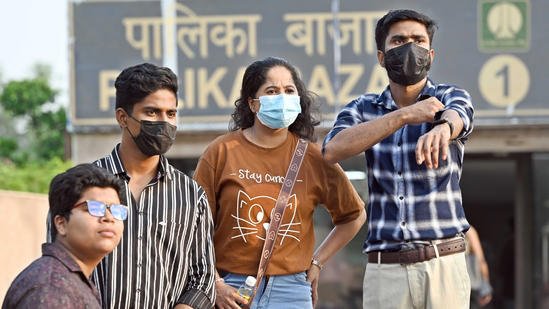
India is witnessing a concerning spike in Covid-19 infections, with over 1000 Covid cases in India reported in the past 24 hours. This surge has prompted public health authorities to raise alerts, especially as four Omicron subvariants have also been identified. While the government has ruled out panic, it emphasizes preventive measures and responsible behavior.
The recent increase, although not severe in clinical outcomes, signals the virus’s continued presence. Most cases remain mild, thanks to vaccination efforts, but the evolving virus strains demand continued attention.
Read More: Gaurav Gogoi Named Assam Congress Chief
Over 1000 Covid Cases in India Raise Alarm
The latest data from the Union Health Ministry confirms over 1000 Covid cases in India, marking the highest single-day count in several months. States like Kerala, Maharashtra, Delhi, and Karnataka have seen the most significant increases. So far, hospitals report manageable patient loads, but authorities are preparing in case numbers grow.
Dr. Randeep Guleria, former AIIMS Director, explained that while these numbers don’t yet indicate a wave, the discovery of multiple subvariants means the virus is actively evolving. “People should avoid panic and instead maintain health precautions,” he advised.
Omicron Subvariants Spread Across States
With over 1000 Covid cases in India reported recently, scientists are also tracking four Omicron subvariants: XBB.1.16, BA.2.86, EG.5 (Eris), and HV.1. The Indian SARS-CoV-2 Genomics Consortium (INSACOG) confirmed these in multiple states.
- XBB.1.16 was dominant earlier in 2023 and continues to circulate.
- BA.2.86 contains several spike protein mutations, raising concerns over immunity evasion.
- EG.5 (Eris) was previously found in Europe and the U.S.
- HV.1 is under current surveillance due to limited data.
These variants have not shown increased severity but are being monitored for transmission and immune resistance. Vaccines remain effective in preventing serious illness.
Precautionary Measures Taken by State Authorities
In response to over 1000 Covid cases in India, state governments have introduced mild containment guidelines rather than enforce lockdowns. The focus is on high-risk individuals and public spaces where transmission is likely.
Some of the advisory measures include:
- Wearing masks in indoor and high-density areas
- Encouraging the elderly and immunocompromised to avoid travel
- Advising symptomatic individuals to stay home and get tested
Kerala has asked hospitals to prepare dedicated Covid wards to remain ready should the trend continue.
Vaccination Key to Preventing Severe Illness
Despite the upward trend, experts stress that India’s widespread vaccination program helps prevent hospitalizations. Dr. N.K. Arora, co-chair of the National Technical Advisory Group on Immunization, has encouraged eligible individuals to receive booster doses.
He emphasized that even with emerging variants, “existing vaccines reduce the risk of severe illness and death.” While two-dose coverage among adults is above 90%, booster uptake still lags, particularly in rural regions.
Healthcare System Still Unburdened
Though over 1000 Covid cases in India were logged, hospitals have not experienced a rise in critical care admissions. ICU beds and oxygen supplies remain adequate, and health departments are reviewing protocols to ensure readiness.
Health workers across states are being retrained to respond effectively in case of sudden surges, a move aimed at preventing stress on medical infrastructure.
Public Health Guidelines Focus on Hygiene and Responsibility
There are no plans for a nationwide lockdown or restrictions. However, the central government has emphasized personal responsibility. Citizens are urged to follow basic health practices:
- Wash hands frequently
- Wear masks in closed or crowded environments
- Isolate when symptomatic or testing positive
- Avoid public gatherings if sick
These practices are especially important as the festive and travel seasons approach.
Enhanced Testing and Surveillance Underway
Health authorities are scaling up RT-PCR testing in areas reporting high case counts. Genome sequencing is also being ramped up under the INSACOG initiative to keep track of new subvariants.
Airports and railway stations in select states have resumed random Covid testing. This is a preventive step to catch early transmission and control potential outbreaks.
Experts Recommend Caution, Not Panic
Although over 1000 Covid cases in India is a cause for concern, health professionals believe that timely interventions can manage the situation effectively. There is no current evidence of increased mortality or hospitalization severity due to the subvariants.
Dr. Guleria advised, “Covid remains manageable if people stay alert and follow basic precautions.” He added that with vaccine support and public cooperation, a major resurgence can be avoided.



